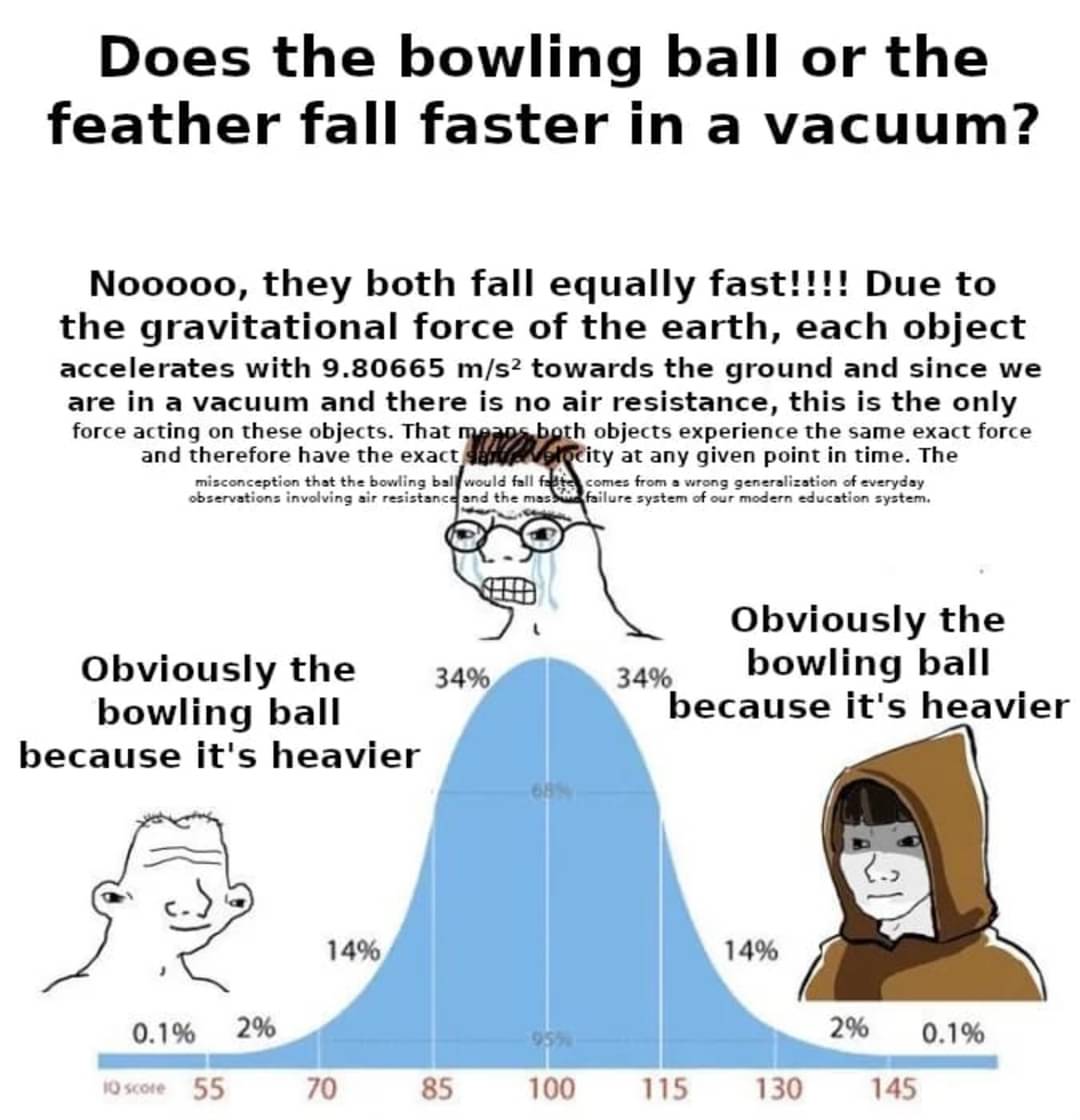this post was submitted on 28 May 2024
216 points (89.4% liked)
Science Memes
12330 readers
1079 users here now
Welcome to c/science_memes @ Mander.xyz!
A place for majestic STEMLORD peacocking, as well as memes about the realities of working in a lab.

Rules
- Don't throw mud. Behave like an intellectual and remember the human.
- Keep it rooted (on topic).
- No spam.
- Infographics welcome, get schooled.
This is a science community. We use the Dawkins definition of meme.
Research Committee
Other Mander Communities
Science and Research
Biology and Life Sciences
- [email protected]
- [email protected]
- [email protected]
- [email protected]
- [email protected]
- [email protected]
- [email protected]
- [email protected]
- [email protected]
- [email protected]
- [email protected]
- [email protected]
- [email protected]
- [email protected]
- [email protected]
- [email protected]
- [email protected]
- [email protected]
- [email protected]
- [email protected]
- [email protected]
- [email protected]
- [email protected]
- [email protected]
- !reptiles and [email protected]
Physical Sciences
- [email protected]
- [email protected]
- [email protected]
- [email protected]
- [email protected]
- [email protected]
- [email protected]
- [email protected]
- [email protected]
Humanities and Social Sciences
Practical and Applied Sciences
- !exercise-and [email protected]
- [email protected]
- !self [email protected]
- [email protected]
- [email protected]
- [email protected]
Memes
Miscellaneous
founded 2 years ago
MODERATORS
you are viewing a single comment's thread
view the rest of the comments
view the rest of the comments

For anyone wondering it's because the bowling ball slightly pulls the earth faster toward itself. This amount is too small to possibly measure. But imagine if the bowling ball were the size of another Earth and it's easier to see why it happens.
Thanks for the non-jargon version
What the fuck did you say to me you little bitch? I'm going to go get $300 million in funding to create a device so complex and so sensitive that a butterfly sneezing 30 miles away will fuck it up and then I'm going to directly measure the the acceleration of the earth as a result of the mass of that bowling ball. You fucked up, kiddo.
The issue isn't so much the sensitivity (although that is a significant issue), it's all the other crap going on. You'll probably be able to filter out the Mains Hum, but every anything moving in the same axis as the test will confount the data.
I'm thinking we might set up the instuments near counterweight energy storage or pumped hydro, and some on the exact opposite side of the planet, and try to measure the movement of the earth that way.
We can already see a change in the length of a day after big earthquakes and dam construction/destruction, but I don't think the acceleration has ever been measured directly.
When you drop them at the same time, it doesn't matter though.
because of two bodies can not occupy the same space, the feather and the ball will be in different position when you drop them. And therefor gravitation will pull the earth slightly more toward the ball and slightly less toward the feather.
But being more massive means that due to inertia the ball will take just a tiny little wee bit longer to start moving no? So they end up falling at the same time.
Also, are these Newtonian mechanics? How do they compare to relativity at the "bowling ball and feather" scale?
Someone please correct me if I'm wrong. It's been a while since I read anything physics-related.
The acceleration from gravity would be the same no matter the object mass (~9.8m/s²).
Oh yes! I omitted that part, but what I meant to say is that mass and inertia balance each other, so that in the end the acceleration from gravity ends up the same for any object.
The bowling ball will still pull the Earth more. For us, everything accelerates at 9.8m/s² (because we all fall to the same Earth), but the Earth accelerates differently per attracting object.
The above is just referring to the fact that the standard "feather vs. bowling ball" question assumes the earth/moon/ground is immovable. In that case, Newton says they fall the same.
The fact that the ground is not immovable is what's being referenced
in this picture, things don't "fall," they are each accelerated towards each other.